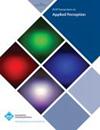The Effects of Visuomotor Calibration to the Perceived Space and Body, through Embodiment in Immersive Virtual Reality
IF 1.9
4区 计算机科学
Q3 COMPUTER SCIENCE, SOFTWARE ENGINEERING
引用次数: 73
Abstract
We easily adapt to changes in the environment that involve cross-sensory discrepancies (e.g., between vision and proprioception). Adaptation can lead to changes in motor commands so that the experienced sensory consequences are appropriate for the new environment (e.g., we program a movement differently while wearing prisms that shift our visual space). In addition to these motor changes, perceptual judgments of space can also be altered (e.g., how far can I reach with my arm?). However, in previous studies that assessed perceptual judgments of space after visuomotor adaptation, the manipulation was always a planar spatial shift, whereas changes in body perception could not directly be assessed. In this study, we investigated the effects of velocity-dependent (spatiotemporal) and spatial scaling distortions of arm movements on space and body perception, taking advantage of immersive virtual reality. Exploiting the perceptual illusion of embodiment in an entire virtual body, we endowed subjects with new spatiotemporal or spatial 3D mappings between motor commands and their sensory consequences. The results imply that spatiotemporal manipulation of 2 and 4 times faster can significantly change participants’ proprioceptive judgments of a virtual object’s size without affecting the perceived body ownership, although it did affect the agency of the movements. Equivalent spatial manipulations of 11 and 22 degrees of angular offset also had a significant effect on the perceived virtual object’s size; however, the mismatched information did not affect either the sense of body ownership or agency. We conclude that adaptation to spatial and spatiotemporal distortion can similarly change our perception of space, although spatiotemporal distortions can more easily be detected.沉浸式虚拟现实中视觉运动校准对感知空间和身体的影响
我们很容易适应涉及跨感官差异的环境变化(例如,视觉和本体感觉之间的差异)。适应可以导致运动指令的变化,从而使所经历的感官结果适合于新环境(例如,当我们戴着改变我们视觉空间的棱镜时,我们对运动进行了不同的编程)。除了这些运动变化,对空间的感知判断也会发生改变(例如,我的手臂能够多远?)然而,在以往评估视觉运动适应后的空间感知判断的研究中,操作总是平面的空间移动,而身体感知的变化不能直接评估。在这项研究中,我们利用沉浸式虚拟现实研究了手臂运动的速度依赖(时空)和空间缩放扭曲对空间和身体感知的影响。利用在整个虚拟身体中体现的感知错觉,我们赋予受试者运动命令与其感官结果之间的新的时空或空间3D映射。结果表明,2倍和4倍的时空操作速度可以显著改变参与者对虚拟物体大小的本体感觉判断,而不影响感知到的身体所有权,尽管它确实影响了运动的代理。11度和22度角偏移的等效空间操作对感知到的虚拟物体的大小也有显著影响;然而,不匹配的信息既不会影响身体所有权感,也不会影响能动性。我们的结论是,对空间和时空扭曲的适应同样会改变我们对空间的感知,尽管时空扭曲更容易被发现。
本文章由计算机程序翻译,如有差异,请以英文原文为准。
求助全文
约1分钟内获得全文
求助全文
来源期刊

ACM Transactions on Applied Perception
工程技术-计算机:软件工程
CiteScore
3.70
自引率
0.00%
发文量
22
审稿时长
12 months
期刊介绍:
ACM Transactions on Applied Perception (TAP) aims to strengthen the synergy between computer science and psychology/perception by publishing top quality papers that help to unify research in these fields.
The journal publishes inter-disciplinary research of significant and lasting value in any topic area that spans both Computer Science and Perceptual Psychology. All papers must incorporate both perceptual and computer science components.
 求助内容:
求助内容: 应助结果提醒方式:
应助结果提醒方式:


